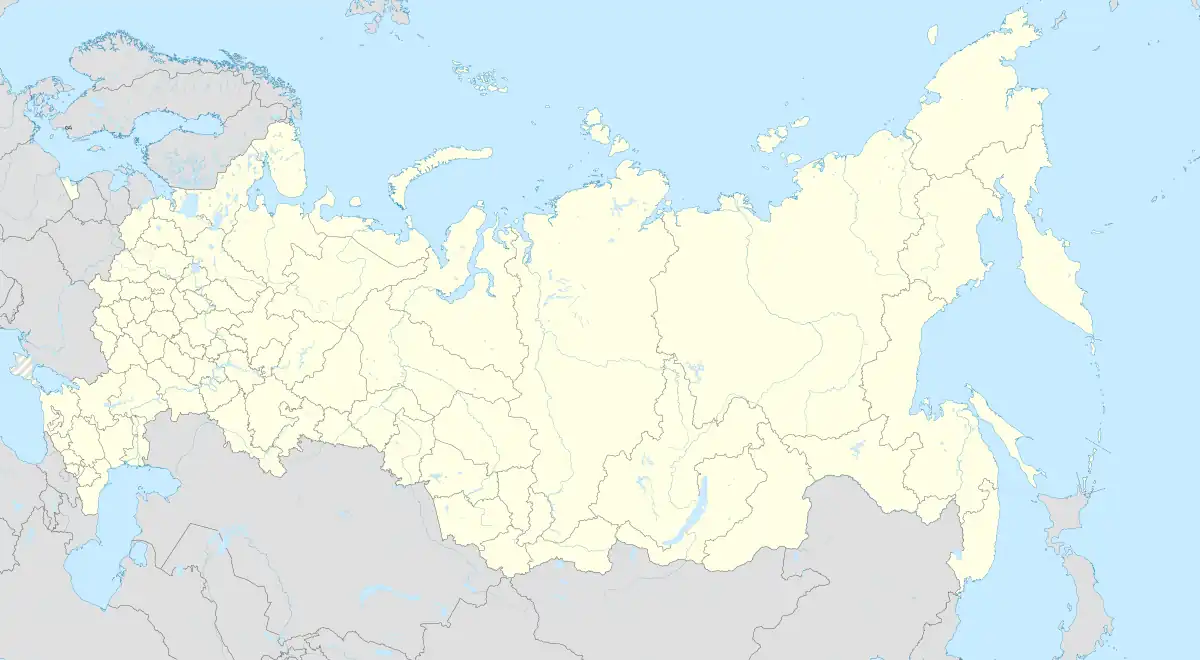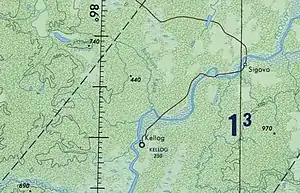Kellog
Kellog (Russian: Келлог) is a rural locality (a settlement) in Turukhansky District of Krasnoyarsk Krai, Russia.[1] It is located by the Yeloguy River.[5]
Kellog
Келлог | |
|---|---|
Location of Kellog | |
 Kellog Location of Kellog  Kellog Kellog (Krasnoyarsk Krai) | |
| Coordinates: 62°29′N 86°16′E | |
| Country | Russia |
| Federal subject | Krasnoyarsk Krai[1] |
| Administrative district | Turukhansky District[1] |
| Population | |
| • Total | 306 |
| • Municipal district | Turukhansk Mun. Dist. Inter-Settlement Territory |
| Time zone | UTC+7 (MSK+4 |
| Postal code(s)[4] | 663237 |
| OKTMO ID | 04654701932 |

Map section centered on Kellog, a section of the Yeloguy River and Lake Dynda, the places where Alexander Kotusov found inspiration for his songs.
Population
Kellog is one of the three localities in which Ket people, a little-known ethnic group whose language is thought by some linguists to be related to the Na-Dene languages of Native Americans, live.[6] It is also the only location in Russia where the Ket language is taught in schools.
As of the 2010 Census, the ethnic composition in Kellog was as follows:
- Ket people: 216 (70.6%)
- Russians: 71 (23.2%)
- Others: 19 (6.2%)
The tomb of Alexander Kotusov (1955–2019), a Ket folk singer and poet, is near the village.[7]
References
Notes
- Law #10-4765
- All-Russian Population Census 2010. Results for the Krasnoyarsk Territory. 1.10 The population of the city districts, municipal districts, etc. (in Russian)
- "Об исчислении времени". Официальный интернет-портал правовой информации (in Russian). June 3, 2011. Retrieved January 19, 2019.
- Почта России. Информационно-вычислительный центр ОАСУ РПО. (Russian Post). Поиск объектов почтовой связи (Postal Objects Search) (in Russian)
- Елогуй, Great Soviet Encyclopedia in 30 vols. / Ch. ed. A.M. Prokhorov - 3rd ed. - M, 1969-1978.
- Vajda, p. xi
- Songs of the last Ket (in Russian)
Sources
- Законодательное собрание Красноярского края. Закон №10-4765 от 10 июня 2010 г. «О перечне административно-территориальных единиц и территориальных единиц Красноярского края», в ред. Закона №7-3007 от 16 декабря 2014 г. «Об изменении административно-территориального устройства Большеулуйского района и о внесении изменений в Закон края "О перечне административно-территориальных единиц и территориальных единиц Красноярского края"». Вступил в силу 1 июля 2010 г. Опубликован: "Ведомости высших органов государственной власти Красноярского края", №33(404), 5 июля 2010 г. (Legislative Assembly of Krasnoyarsk Krai. Law #10-4765 of June 10, 2010 On the Registry of the Administrative-Territorial Units and the Territorial Units of Krasnoyarsk Krai, as amended by the Law #7-3007 of December 16, 2014 On Changing the Administrative-Territorial Structure of Bolsheuluysky District and on Amending the Krai Law "On the Registry of the Administrative-Territorial Units and the Territorial Units of Krasnoyarsk Krai". Effective as of July 1, 2010.).
- Vajda, Edward J. (2001), Yeniseian Peoples and Languages: A History of Yeniseian Studies With an Annotated Bibliography and a Source Guide, Psychology Press, ISBN 0700712909
This article is issued from Wikipedia. The text is licensed under Creative Commons - Attribution - Sharealike. Additional terms may apply for the media files.